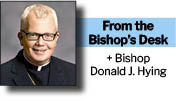
A recurrent debate on Catholic social media is the question of saintly intercession.
Time and again, I see a Catholic blogger responding to a Protestant criticism regarding the role of the Blessed Virgin Mary, the honor we pay to her, and the efficacy of praying to the saints.
This discussion brings to mind the whole doctrine of Jesus as Mediator and how Catholicism embraces the mediation of divine grace.
Scripture tells us that Christ is the sole Mediator between God and humanity; He is the point of connection, bringing people to the Father and offering the fullness of the Divine to humanity. Jesus accomplishes this through His Incarnation, ministry and death, and resurrection.
When the Word became flesh, the divine nature of the Son of God was perfectly joined to our human nature, minus sin, in one divine person.
We call this mystery the hypostatic union, an absolutely unique divine action, whereby God completely embraced our humanity in radical humility for the sake of our eternal salvation.
In Jesus’ ministry, the crowds heard God teaching them directly, felt God’s healing touch in the many miracles, and saw the human incarnation of the Lord Himself.
In the Old Testament, only certain chosen individuals, such as Moses, experienced the privilege of speaking with God, but now in Jesus, the Lord is fully visible, available, and accessible.
We cannot overestimate the wonder of this divine closeness to the human condition, as a profound manifestation of God’s perfect and infinite love for every person.
In Jesus’ death and resurrection, His role as mediator is on full display, for it is in the Paschal Mystery that the Son reconciles us to the Father and to one another in His complete and total sacrifice on the Cross.
Think of the vertical line of the Cross as the point of connection between God and humanity, and the horizontal line as the gathering of all people into the loving embrace of Jesus. The crucified and risen Christ is the Sole Mediator, redeeming and reconciling fallen man back to God.
Presence within the Church
Jesus’ mediation carries forward in the Church. The Lord very purposefully founded the Church as both His Body and Bride to be the continuation of His divine presence and saving action in the world.
Just as Jesus Christ makes the invisible God present, so too the Church makes Jesus present through time and space until the end of human history. How does She do that? By preaching the Gospel, celebrating the sacraments, and leading people into a loving relationship with the Lord.
The Church has the full authority in the power of the Holy Spirit to teach and act in the name of Jesus Christ.
We hear God speaking to us in the proclamation of the Scriptures at Mass, we are born into the life of the Trinity in Baptism, forgiven by Jesus in Confession, healed by Him in the Sacrament of the Sick, and fed with His Sacred Body in the Most Holy Eucharist. The Church and her sacraments make Jesus fully present all over the world all of the time. He is always available to us.
Jesus’ mediation continues in the Blessed Virgin Mary and the saints as well. Because of their full and perfect union with Christ in Heaven, they can and do intercede for us before the Father’s throne.
While our prayer and worship should always be focused on God alone, we can also ask the Lord’s friends to pray for us, as naturally as we would turn to a loved one here on earth and ask them to intercede for us.
The power of this intercessory prayer is manifest in the Scriptures, in the lives of the saints, and in our own experience.
Because of their diverse qualities and histories, the Church associates many of the saints with particular causes and needs.
St. Anthony is the patron of lost things; St. Dymphna of those with mental or emotional challenges; St. Francis of Assisi is the patron of Italy, animals, and ecology; and Sts. Jude and Rita are the ones we turn to when we face impossible situations.
I have found St. Thérèse of Lisieux, whose memorial we celebrated on October 1, to be an extraordinary intercessor in times of need.
She has helped me in so many countless situations that I feel the need to publicly pay tribute to her friendship and help, she who promised to spend her heaven doing good on earth. Pray to her; she will not disappoint.
Part of our Faith
This extended understanding of divine mediation is an inherent part of Catholicism. The Protestant position would insist that Jesus is the sole Mediator and would reject the need and the efficacy of the Church and her sacraments or the possibility of turning to the saints for assistance, viewing such extensions of the Lord’s power as distractions.
The Catholic Church, on the other hand, teaches that the Lord founded the Church to be the extension of Himself until the end of time.
The sacraments, the saints, and the sacramentals do not, of course, take the place of Jesus, but powerfully and effectively point us to the Lord as the source and hope of our salvation and forgiveness.
One of the many reasons I love being Catholic is our rich heritage of faithful tradition which gave us St. Peter’s Basilica, Mother Teresa, Mozart’s Mass in C Minor, the crucifix of San Damiano, the Pieta, the Camino of Santiago, and thousands of other remarkable treasures.
All of these spiritual gifts lead us to Jesus!

